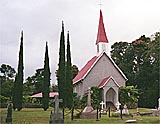By Timothy Hurley
Advertiser Staff Writer
It was nearly 10 years ago that supporters of tiny Christ Church in Kealakekua, Hawai‘i, fought back a proposal to demolish the historic building of the oldest Episcopal church in the state.
 |
| Members of Christ Church in Kealakekua, Hawai‘i, are trying to resolve a dispute over a lighter color for its walls and installation of new pews.
Hugh Clarke • The Honolulu Advertiser |
Now some in the community are questioning whether another renovation project is again threatening the historical integrity of the building.
The church, founded in 1867, is in the process of replacing its old wooden pews and painting the building’s interior, to lighten a sanctuary that has always been dark brown.
"It’s changing the whole character of the church," complained Peter Greenwell, whose family has attended the church for generations.
"It’s being desecrated,' said John Mitchell, a former altar boy who was baptized and confirmed at Christ Church. "They’re turning it into a modern McDonald’s-kind of church. It was fine the way it was."
Begun as an outpost of the Anglican Mission to Hawai‘i, Christ Church was founded in 1867 by the Rev. Charles George Williamson, who built the current nave as a schoolhouse for immigrant children and as a place of worship for Native Hawaiians. The steepled church begun by Wil-
liamson is among the oldest in Hawai‘i, and is still used for worship each Sunday.
The Rev. Carol M. Arney said the rehabilitation project has been in the works for a year, ever since a member pointed out that the pews were covered with toxic, lead-based paint. The member, a parent with small children, had actually taken a chip and had it tested.
Arney, the church’s rector for two and a half years, said she made the decision to proceed with the project after meeting with church members and consulting an architect. Her goal was to maintain the historical integrity of the church, which she believes she’s done.
Historical records missing
There are no historical records showing when the pews were built, Arney noted, as there are for other items in the church. She suspects the pews are not original, although one will be donated to the Kona Historical Society.
After investigating different options, she said it was not practical to refurbish the pews, which she described as termite-damaged and frail, and no carpenter was available to recreate them.
The church ordered new, padded, solid oak pews of a gothic architectural style described as complementary to the building. They should arrive in the next week or so.
As for the paint job, Arney said an off-white color had been selected to unify the light-colored altar area with the rest of the church, a dark brown bordering on black.
While off-white is not the original color, it is appropriate given the church’s period, according to A. Spencer Leineweber, University of Hawai‘i associate professor of architecture and the church’s architectural consultant.
In a report on the painting project, Leineweber said the original walls probably were unpainted, with shades of brown subsequently added. A new light color, she said, would give the church "an appropriate historic feeling,’’ as it was commonly used in wood-framed churches in Hawai‘i.
Arney said the lighter walls would add light and airiness to the church and help get everyone involved in the worship service.
"The congregation leadership has wanted a lighter color for years," she said.
But critics, many of them Greenwells — a large Kona family that helped to found the church — say the building is a historical treasure that should be maintained as is.
Peter Greenwell said many family members learned about the changes while visiting over the holidays, and are rightfully concerned that the church they helped to save a decade ago is now changing too much.
Losing church 'a horrible thought'
Joan Coupe, a family member now living on O‘ahu, visited Kona in December and is disturbed by what’s happening. She said the changes represent an erosion in historical authenticity. She said her fear is that the changes will add up, and one day the church won’t be worth saving anymore.
"That’s a horrible thought," she said.
Not all the Greenwells agree. Sherwood Greenwell, an active church member and president and founder of the Kona Historical Society, said the project doesn’t come close to threatening the historical integrity of the church. He described the changes as minor.
"Change is inevitable to any living church, and our church is a living church," he said, adding that he welcomes the new seating because the old pews were "too hard on the ‘okole."
Arney said she kept most church members informed about the project over the past year, and that it’s frustrating to run into opposition at a point of no return.
"It’s like cleaning out the attic and accidentally hitting a hornets’ nest," she said. "They’re understandably concerned. It’s their church through history."
Still, Arney said her job is to balance the concerns of history with the concerns and needs of the current congregation. "We’re doing the best we can."
The pews have been removed and the painting began Wednesday morning. The project is expected to be completed by Jan. 21. Interim worship services are being held in the church’s fellowship hall.
[back to top] |

